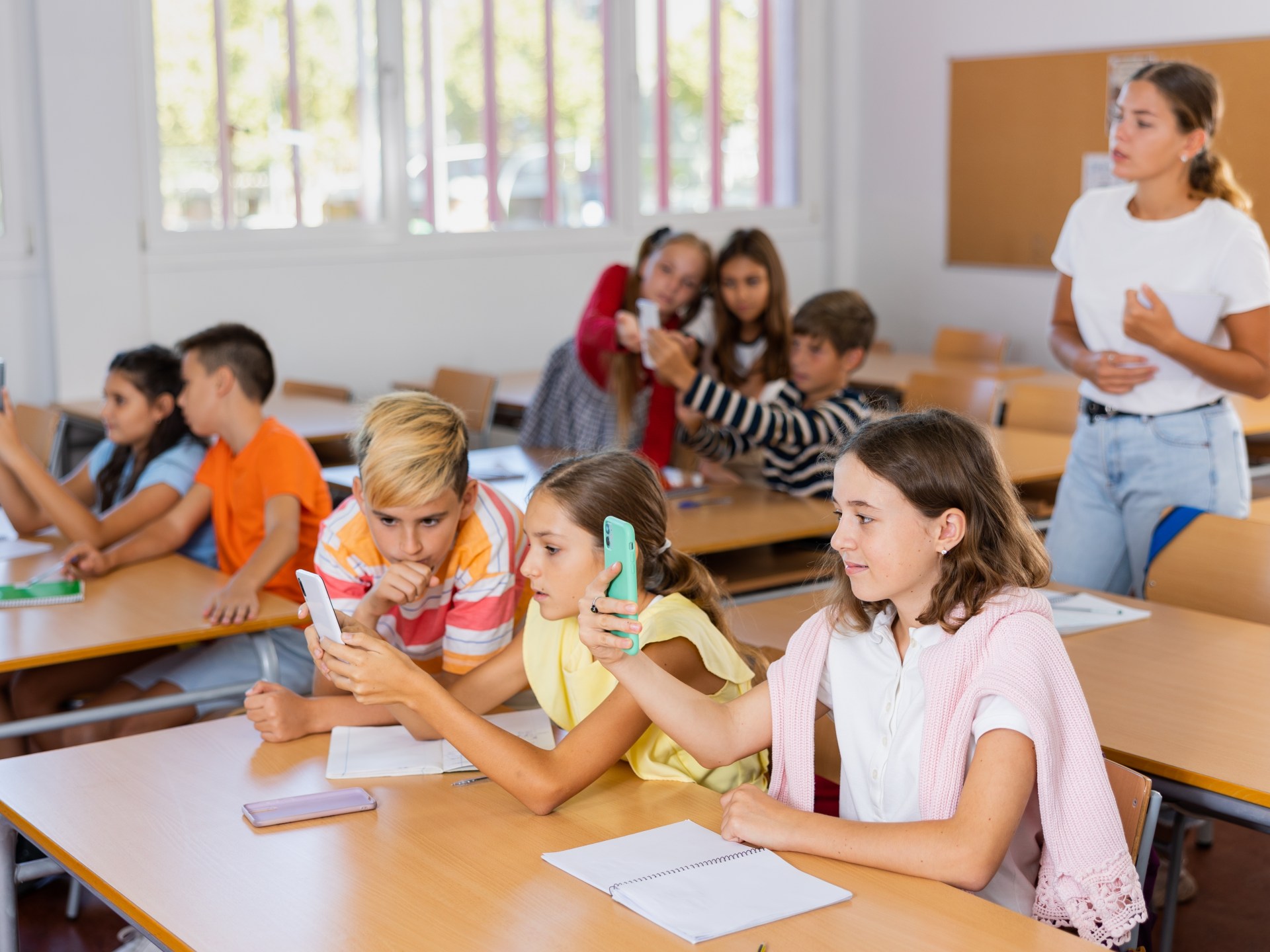Because people are out of touch, saved you an article
Well I don’t think that is the case. Parents and teachers are observing students not paying attention.
I would think if an educator can teach a full lesson, while also ensuring that students retain the information, when the student is watching YouTube, endlessly scrolling reddit or lemmy, or on Instagram this wouldn’t be an issue.
The problem is that students aren’t retaining the knowledge being provided to them.
Here’s the thing, in general. Phone or no phone, the problem your mentioned is down to the teacher. I’ve had good teachers that are able to make a lesson entertaining and guess what. That actually works, people aren’t bored to death and shit gets done.
To contrast, boring lessons, even without factoring in phones, nobody gives a shit for good reason. We just focus on something else, wetger that’s a phone or something else isn’t a factor. Its rather the lesson itself
To address the retaining info part. If somebody talked to you for about half an hour on some random thing you don’t care about. How much do you think you would remember or focus on. Spoiler alert, probably not much
Why not banning them in schools, are they needed for studying?
I’m not sure why I see people treating banning smartphones in class like child abuse or something. The only explanation I have is that it’s a cultural thing. Obviously, if used appropriately, a smartphone is a valuable tool, but this is only if they are used appropriately, which some students will do and some won’t (and this varies as well from school to school and class to class). Where I went to school, a significant number of students did not use them appropriately during class, so not allowing them made sense since they distracted from the lesson.
So, why do I have so little confidence that they’ll be used properly? Some people are posting anecdotes about their time as teachers in this thread, so I’ll post one from the student’s perspective. Despite smartphones not being allowed in my classes in high school, people used them anyway. Why? The teachers wouldn’t notice, or some might just not say anything. I played the heck out of one mobile game with my friends in both of my history classes, and nothing ever happened. I knew people who’d be listening to music during class too, and completely ignore the lecture itself. Almost everyone with a phone out used it as a distraction from class, not as a tool to help them learn. Despite there being a rule against them, I’d estimate more than half of the people I went to school with used them during class anyway.
So why didn’t the teachers enforce it more strictly? My guess is because it wasn’t safe. Many of my friends carried knives at school for self defense. There were a lot of violent students, ranging from fights in the hallway to students being part of a gang. To be clear, this wasn’t by any means the majority of the student body, but it wasn’t an insignificant portion of it either.
The violence escalated dramatically after the 2016 election, where students (who were understandably upset about the result) got up and threatened all the white people in the school. I had graduated by then, but I knew people who had to barricade themselves in a room with a mob of angry knife-wielding students on the other side of the door. Many of the students in the room weren’t even old enough to vote. One teacher left the school because of all the threats she’d received.
Also, not sure how common it is to have a “senior prank day” at other schools, but we had one every year. The “pranks” ranged from spray painting threats to teachers on the outside of the gym, to destroying school property. Once they had to put classes on pause while a company came out to replace the locks on all the doors since the “prank” was to destroy the locks so the doors couldn’t be opened.
This school was pretty tame too, compared to some of the schools I’d heard stories of. One teacher I talked to at a different school had stories about all the times some student threatened her or pulled a gun out on her or whatever, and it honestly just sounded like hell.
Anyway, I wouldn’t say I blame the kids for this behavior, and while I have strong opinions against feed-driven social media, I don’t think it was a major contributor to these behaviors (this was before social media was as big as it is now). I think it really comes down to parenting, whether the parents are just bad at raising kids, or they don’t have time or resources to properly raise their kids, or their kids have needs they don’t know how to (or refuse to) satisfy. Regardless, a teacher can only do so much, so rather than trying to correct behaviors in students at the risk of their own lives, I think a lot of them just put up with it for the sake of the students who do want to learn.
So if the rule is going to be broken anyway, why have a rule against smartphones? It sets the expectation of students regarding smartphone usage, and gives teachers an opportunity to enforce that rule when they feel it’s appropriate (and safe) to do so.
Edit: I should also add that I don’t think most schools are this violent. This school was exceptionally bad, but it wasn’t as uncommon as you might think to have a school this violent.
I am in full agreement that cell phones should not be out of the backpack or pocket unless there is an emergency or it’s lunch time / outside of class.
But for the love of critical thinking, also please ban the teachers from using ChatGPT to create their tests for them. I was appalled at finding out teachers at my kid’s school are doing that. While I support any tool (and funding!) that can make the lives and jobs of teachers easier, using a tool like ChatGPT is as irresponsible as telling kids to just Google it. And teachers/administrators should damn well know better.
There is no emergency that can’t be handled by the adults of the school.
I can understand needing a phone for the commute, but at school it should stay in the bag turned off.
There are emergencies the adults at the school won’t understand. This has happened a few times to my spouse, where the nurse/teachers kept brushing off issues they didn’t understand, ranging from things like asthma to strep throat.
Otherwise, I agree that the phones should be put away during class.
I hear you. But my child will have a cell phone in case of a real emergency when the adults don’t properly act. While I trust teachers rather implicitly, my experience with most school administrators is far less stellar. Also, a student calling 911 when the teacher is having a heart attack or some other life threatening event will save time and possibly their life.
Barring any emergency situations, my child’s phone better be put away.
A dumb phone can do that without the damage caused by smart phones.
When did I mention the use of a smart phone?
deleted by creator
I’m currently rebuilding my math foundation and part of that process was tracking down high quality educational resources with passionate instructors, rigor, and entertainment factor (because I want stuff to recommend to parents). I did eventually find something that was better than what I got in grade school, but I have to say that the Pythagorean Theorem just isn’t going to be as interesting as social media feeds and entertainment products custom tailored to my preferences. No teacher is realistically going to be able to compete with the multi-billion dollar entertainment industry for attention and tech companies are abusing psychology research to make their shit as addictive as possible. It’s not the biggest problem with the US educational system, but it is one of many, so I’m down with restricting smartphone access at schools.
I agree with the conclusion of the article:
“School’s the same for 120 years, where kids go nine to three, have long holidays, sit at desks and have to regurgitate what the adults tell them to learn, basically all over the world. We’re blaming kids for falling academic standards, we’re blaming the rise in mental ill health, we’re blaming the rise of cyberbullying. Oh, well, it all must be the fault of the mobile phone,” Marilyn Campbell told Al Jazeera.
“I mean, what a simplistic view of how we are educating our children in a different world and taking away that main tool that we’re all using in society and saying, ‘No, the kids can’t have it now’.”
A balanced approach, involving regulated use and clear guidelines, may be the most effective way to harness the benefits of smartphones while minimising their drawbacks, experts say.
The general recommendation of Campbell and Edwards, who carried out the scoping review in Australia, was to leave it to individual schools to determine smartphone use and to focus on helping children to use smartphones positively.
As an educator and parent, I couldn’t disagree more strongly. Smart phones are addiction machines and childhood experience blockers. Children should not have smart phones at all until age 16. Age 16 would be a very appropriate time to introduce smart phones after their harms have been explained in detail at ages 12 through 15.
Banning cell phones during instructional time doesn’t go far enough. Students having a smart phone in their pocket is damaging. (Dumb phones are fine—SMS texting and phone calls are great.)
There has been a precipitous decline in youth mental health globally in nations where cell phones were affordable starting in 2010. The evidence is clear. Smart phones (and, more broadly, addictive dark patterns in all apps/games) are a big problem.
If you want to learn more, read the first chapter of The Anxious Generation by Jonathan Haidt. (I’d recommend the full book if you want details, but chapter 1 is enough to give you a grounding in the data and the broad strokes of the argument.)
Out of curiosity, (given that in another comment you talked about home schooling) when you call yourself an educator, do you have a teaching certificate in your state, or other professional teaching certification?
I’m not trying to be rude, but since you began by invoking the title of “educator” as an appeal to authority in this area, I think it’s important to clarify that you are in fact such.
I’m certified to teach in my jurisdiction. I have a teaching degree, and I have completed additional professional training specific to this topic through conferences, books, and other professional development (PD).
I can’t source conference talks or teacher PD groups, so I sourced a popular press book that’s approachable to laymen.
Awesome, thank you.






